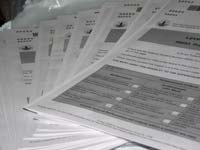![]() It’s a familiar scene – the wee hours of the morning are ticking away and your head is bent over a stack of notes, desperately trying to cram as much knowledge into your head before the test in the morning.
It’s a familiar scene – the wee hours of the morning are ticking away and your head is bent over a stack of notes, desperately trying to cram as much knowledge into your head before the test in the morning.
 Because of the way our education system works, this process of hard studying has become almost synonymous with the act of learning, and the inevitable tests and exams that bookend this ordeal merely assess how much information has stuck.
Because of the way our education system works, this process of hard studying has become almost synonymous with the act of learning, and the inevitable tests and exams that bookend this ordeal merely assess how much information has stuck.
But a new study reveals that the tests themselves do more good for our ability to learn that the many hours before them spent relentlessly poring over notes and textbook. The act of repeatedly retrieving and using learned information drives memories into long-term storage, while repetitive revision produced almost no benefits.
Studying vs. testing
To separate the effects of studying and testing on memory, Jeffrey Karpicke from Purdue University and Henry Roediger III from Washington University in St Louis set a group of local university students to a simple learning exercise.
At first, all of them were asked to study 40 pairs of English words and their Swahili equivalents, such as boat and mashua and were then tested on each pair to see how many they could remember. The students were then split into four groups who were put through three more rounds of studying and testing but with important differences.
For Group 1, the three further rounds were exactly like the first. For Group 2, any recalled pair of words were dropped from the study lists but were still tested. Group 3 faced the opposite condition – their correct answers were dropped from the subsequent tests but they were still asked to study them. And finally, Group 4′s correct answers were omitted both from later study sessions and later tests.
 This fourth situation most closely mirrors what conventional wisdom tells us to do. Once something is learned, that’s the end of the story and our attentions should focus on trickier facts that haven’t been so amenable to memory.
This fourth situation most closely mirrors what conventional wisdom tells us to do. Once something is learned, that’s the end of the story and our attentions should focus on trickier facts that haven’t been so amenable to memory.
After four rounds, the students had done an almost perfect job. Almost all of them remembered almost all of the 40 word pairs and all four groups picked up the words at the same rate.
Testing times
The successful students were sent away, but Karpicke and Roediger reconvened them one week later for a final test of their rudimentary Swahili vocabularies. All the students from the four groups had predicted that in a week’s time, they would remember about half of the words they had learned. But the reality was very different – two of the groups achieved much higher scores than the others.
Repeated testing was the critical factor. The first two groups were repeatedly tested on all the word pairs regardless of whether they successfully remembered them or not. A week later, they still remembered 80% of the words they had learned and Group 2, who didn’t have to study words they correctly remembered did just as well as Group 1, who had to pore over the full lists.
Students in the last two groups were not tested on words once they had remembered them correctly once, and they suffered for it. After a week, they remembered only about a third of the 40 pairs. Even Group 3, who repeatedly studied every pair in every study period fared much worse in the long run than Group 2, who studied selectively but were tested comprehensively.
 The study’s results are as amazing as they are counter-intuitive. They showed that where long-term memory is concerned, the act of repeated studying brings essentially no benefits, especially once a piece of information can already be dredged up from memory. Repeated testing, on the other hand, is of paramount importance, even for facts that can already be successfully recalled.
The study’s results are as amazing as they are counter-intuitive. They showed that where long-term memory is concerned, the act of repeated studying brings essentially no benefits, especially once a piece of information can already be dredged up from memory. Repeated testing, on the other hand, is of paramount importance, even for facts that can already be successfully recalled.
Implications
If this seems like an obvious conclusion in retrospect, consider the fact that the students themselves were unaware of it. All of them predicted that they would score about 50% in the final test where in fact, the average scores were either substantially higher or lower.
Indeed, surveys have shown that very few students use self-testing as a strategy for revision. When they do, it’s more to work out what they have or have not learned rather than as an active part of the process. And once they have successfully memorised something, they tend to drop it from further practice.
Karpicke’s and Roediger’s study makes a case for tests and exams to move away from their crude use as assessment tools. Currently, they are stressful and high-stakes affairs, deployed at the end of academic terms to mark an endpoint of the learning process. Perhaps, if they were used in a more continuous and informal capacity, they could actually contribute too.
Photos by Gabriel Pollard, Michael Surran and Milford
Reference:Karpicke, J.D., Roediger, H.L. (2008). The Critical Importance of Retrieval for Learning. Science, 319(5865), 966-968. DOI: 10.1126/science.1152408
